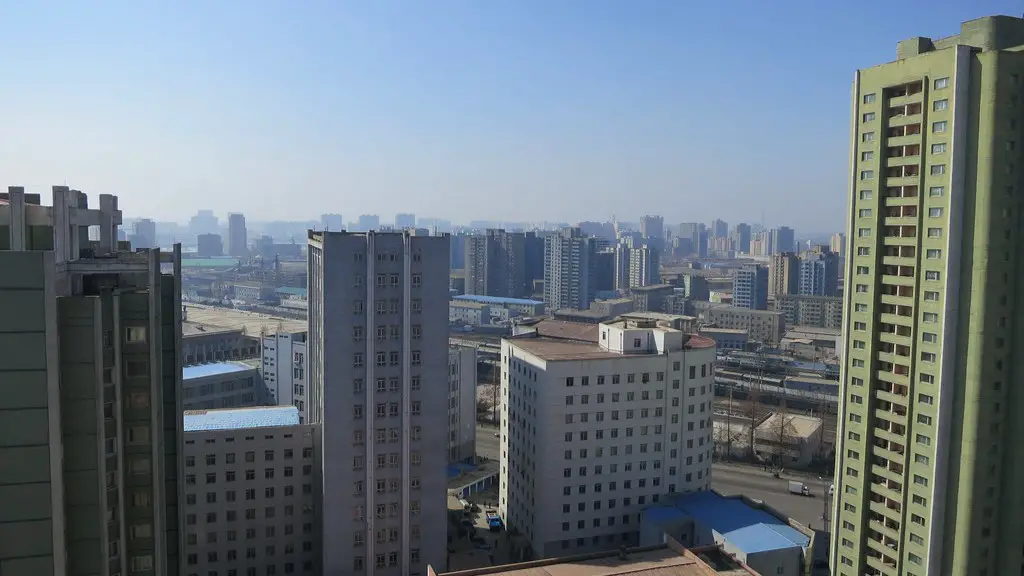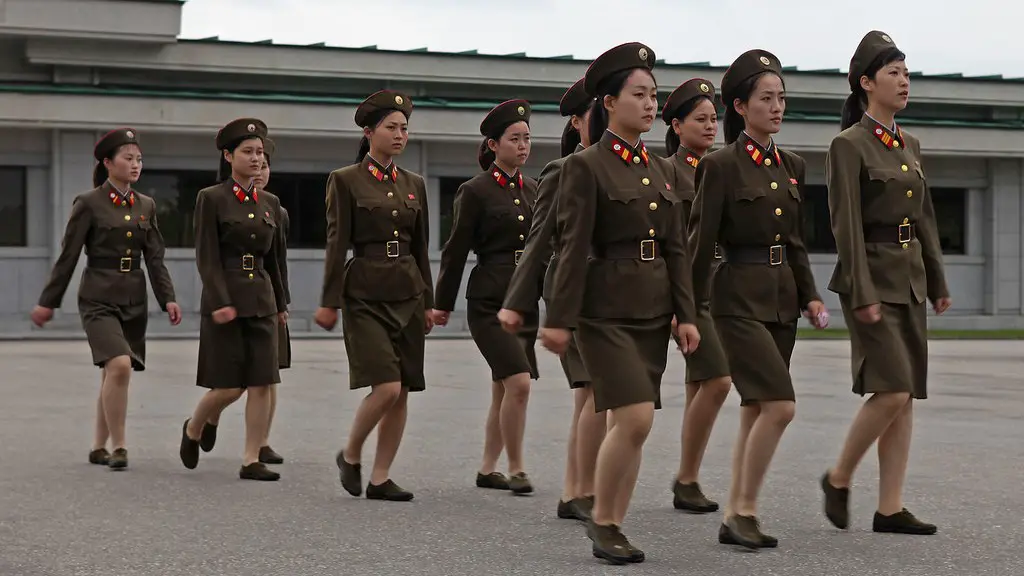China and North Korea have had a complex relationship for decades, with the two countries often cooperating economically and militarily. China is North Korea’s closest ally, providing the isolated nation with food, fuel and diplomatic support. But what reasons lie behind China’s willingness to help North Korea?
On a political level, China is motivated by its desire to maintain stability in the region and protect its own interests. North Korea provides a buffer between China and the US, which maintains a strong military presence in the region, something China wishes to combat. China is also committed to preserving the basic structure of the North Korean regime and is wary of any kind of regime change that might lead to instability.
Economically, China is heavily investing in both North Korean infrastructure and its own presence in the capital Pyongyang, such as its Liaison Office, established in 2018. In fact, since the late 1990s, China has become North Korea’s largest trading partner, with trade between the two countries currently estimated to be around $6 billion per year.
In addition, China has repeatedly offered humanitarian assistance to North Korea, including providing food and vital medicines. In 2011, China donated $4.7 million in aid for food relief and medical aid, and in 2012, Chinese NGOs provided North Korea with $36.7 million in aid.
However, not everyone is convinced of China’s commitment to North Korea and its motives for helping the country. Some experts argue that, by assisting North Korea, China is merely reaping the rewards of being able to exercise political leverage over North Korea. Others assert that China’s main goal is to undermine US power in the region by using North Korea as a pawn in its wider strategy.
Meanwhile, there are some who are critical of China’s commitment to helping North Korea, claiming that it is enabling the regime’s authoritarian policies and refusal to obey international laws and standards.
International Pressure
Amidst the ongoing nuclear threats from North Korea and its failure to comply with UN sanctions, the international community has been increasing pressure on China to do more to enforce such sanctions and take responsibility for any North Korean misbehavior.
China has been reluctant to do more than it already has, insisting that it does not have the power to pressure North Korea into changing its policies, and that any action taken must be done diplomatically and through cooperation.
Nevertheless, with the US in particular accusing China of doing too little to rein in North Korea, it remains to be seen how the international community can succeed in pressuring China to take greater action.
Nuclear Weapon to Blame For International Relationships
The international community’s suspicions of China will likely not subside while North Korea continues to pursue its nuclear weapons program.
After a series of successful missile tests in 2017, North Korea declared itself a nuclear-armed state and has since threatened to use its missiles against its neighbors, including the US, China, South Korea and Japan.
In response to these threats, the US and its allies have imposed numerous economic sanctions on North Korea, as well as pushing for greater diplomatic pressure from China. China is the only major international player with real leverage over North Korea, but its unwillingness to impose harsher sanctions suggests that it does not have the same level of concern about North Korea’s nuclear ambitions as its neighbors.
China’s support for North Korea is complex but, in a nutshell, China’s perceived interests in supporting North Korea outweigh the downside of the nuclear threat.
Promoting peace
Another factor in driving China’s relations with North Korea is its commitment to promoting peace and stability in the region. By maintaining a friendly relationship with North Korea and engaging in dialogue and negotiations, China hopes to persuade Pyongyang to commit to denuclearization and to address other security issues.
China has often called for a “double-freeze” policy, whereby North Korea agrees to freeze its nuclear and missile tests while the US agrees to suspend its military exercises in the region. This policy has thus far been unsuccessful, but China has also been pushing for North Korea to negotiate a peace treaty with South Korea as well as for China, North Korea and the US to reach some kind of agreement over denuclearization and international relations.
Therefore, despite China’s concerns over North Korea’s nuclear program, its commitment to peace and stability in the region is a strong motivating factor in its decision to maintain good relations with the isolated nation.
The New Increasing Partnership
In recent years, China and North Korea have sought to strengthen their relations through trade and infrastructure projects.
China has invested billions in infrastructure projects in North Korea, such as the Rason special economic zone and the Renmin University of North Korea. In addition, both countries recently signed an economic and technology cooperation agreement, which will enable them to collaborate on agricultural, energy and IT projects, as well as aid in economic sectors such as tourism, e-commerce and technology.
The increased partnership between China and North Korea could mark an important shift in the region, with China taking a more active role in promoting economic, technological and social progress in North Korea.
China’s role in helping North Korea is therefore a complex mix of motivations, from protecting its own interests to promoting peace and stability in the region. While there is much to be done, China’s commitment to helping North Korea is seen as essential to the overall state of the region, and to ensuring peace and security for the people of both countries.
China’s View of North Korea a Global Issue
The growing ties between China and North Korea will have an impact on other countries in the world, particularly those in the region.
For its part, Japan is watching increasingly close, and is likely to take a hard line against any weakening of sanctions against North Korea. On the other hand, South Korea has been pushing for closer ties with the North and has suggested strength in unity.
The increasing cooperation between China and North Korea is also attracting the attention of the US, which is likely to put pressure on China to restrain North Korea’s nuclear ambitions. Regardless, China’s views of North Korea are highly likely to affect global politics and how the other powers in the region react.
US Sanctions and Foreign Affairs
In response to North Korea’s nuclear ambitions, the US has imposed a series of economic sanctions, which have heavily impacted China’s trade with North Korea.
The sanctions have also increased tensions between the US and China, as the US accused China of not doing enough to stop North Korea’s nuclear weapons program. In response, China has argued that the US’s sanctions are doing more harm than good and that a more diplomatic solution is needed.
At the same time, China is attempting to remain neutral in the dispute, emphasizing its commitment to peace and stability in the region and calling for all sides to come to an agreement through cooperation and dialogue.
Overall, it is clear that China’s role in helping North Korea is a complex mix of political, economic and international considerations. Whatever China’s reasons for helping North Korea, it remains to be seen how the international community will respond to these increasingly close ties in the future.




